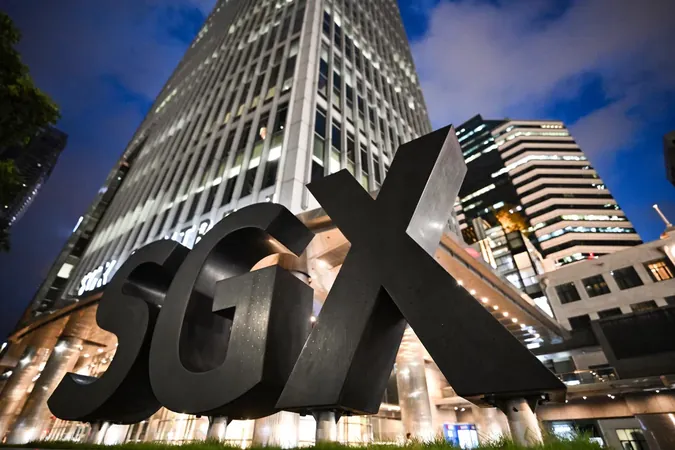
Investors Urged to Stay Defensive Amid Equity Market Turbulence
2025-04-06
Author: Mei
Introduction
As global markets face one of the sharpest sell-offs in years, particularly on Wall Street, equity analysts are strongly advising investors to adopt a risk-off strategy and focus on defensive plays rather than trying to time the market recovery.
Caution from Analysts
Philipp Lienhardt, head of equity research at Julius Baer, expressed caution for those looking to 'buy the dip,' emphasizing that any brief recoveries in US equities should be viewed as opportunities to sell and diversify investments. He noted, 'Policy uncertainties will likely persist, and volatility in equity markets is expected to remain high. However, we may have reached a ‘peak tariff news’ moment.'
Louis Koay of Phillip Securities agreed, suggesting that while some investors might panic sell, long-term investors should accept the inherent risks of equity investing. 'Speculative traders should cut their losses, as the downward trend looks set to continue,' Koay stated, offering a clear distinction between short-term traders and long-term investors.
Market Impact of Tariff Announcements
This cautious atmosphere follows powerful tariff announcements from the US government, which have plunged markets into chaos, erasing over $5.4 trillion in value from the S&P 500 index alone—the steepest decline seen since the pandemic struck in 2020. Analysts are now predicting an inevitable surge in inflation as imported goods become more expensive, adding to the financial burdens on consumers.
Federal Reserve's Dilemma
The Federal Reserve, which had been raising interest rates to combat inflation, now finds itself in a dilemma. Analysts suggest that continued rises in tariffs might hinder economic growth, leading to potential rate cuts in the future—an action that could constrict net interest margins for banks, as pointed out by Thilan Wickramasinghe from Maybank Securities.
Regional Market Reactions
In Singapore, markets reacted negatively to the turmoil, with DBS Group—Southeast Asia's largest bank—falling nearly 5%. Other major banks also experienced declines, reflecting the increased uncertainty around interest rates and the economy.
Opportunities in Defensive Sectors
Nevertheless, there could be silver linings for certain sectors. Despite the expected downturn due to tariffs, Singaporean equities may hold up better than their counterparts in the region, given the country’s lesser tariff exposure and strong fiscal health. Wickramasinghe mentioned that the Johor-Singapore Special Economic Zone might become advantageous in attracting supply-chain relocations.
Meanwhile, the prospect of lower interest rates could benefit Real Estate Investment Trusts (REITs). 'A falling interest rate environment could boost REITs with domestic exposure,' Wickramasinghe added. Top recommendations include CapitaLand Integrated Commercial Trust and Frasers Centrepoint Trust.
Stock Recommendations
For equity markets in general, companies with strong domestic market focuses may outperform those more reliant on international trade. Analysts favor stocks like Sheng Siong Group, Raffles Medical Group, and ComfortDelGro Corp for their stability during turbulent times.
Furthermore, sectors such as technology with 'local-for-local manufacturing' strategies, like Grand Venture Technology and UMS Integration, are seen as more resilient against the tariff-driven uncertainties compared to those heavily reliant on exports. Consumer staples, such as DFI Retail Group and Sheng Siong Group, are projected to weather the storm better than sectors exposed to discretionary spending.
Earnings Season Insights
As earnings season approaches, investors are keenly awaiting insights from companies on their strategies to counteract the adverse effects of tariffs, including potential price increases and adjustments to supply chains.
Conclusion
Market experts maintain that the ultimate impact will revolve around demand dynamics, as the ongoing uncertainty is likely to keep valuation multiples under pressure. As volatility continues, investors are encouraged to remain strategic and defensive, focusing on companies with stable earnings and strong dividend yields.
In a world where financial landscapes shift rapidly, staying defensive might not just be a strategy, it could be the key to navigating the storm effectively.



 Brasil (PT)
Brasil (PT)
 Canada (EN)
Canada (EN)
 Chile (ES)
Chile (ES)
 Česko (CS)
Česko (CS)
 대한민국 (KO)
대한민국 (KO)
 España (ES)
España (ES)
 France (FR)
France (FR)
 Hong Kong (EN)
Hong Kong (EN)
 Italia (IT)
Italia (IT)
 日本 (JA)
日本 (JA)
 Magyarország (HU)
Magyarország (HU)
 Norge (NO)
Norge (NO)
 Polska (PL)
Polska (PL)
 Schweiz (DE)
Schweiz (DE)
 Singapore (EN)
Singapore (EN)
 Sverige (SV)
Sverige (SV)
 Suomi (FI)
Suomi (FI)
 Türkiye (TR)
Türkiye (TR)
 الإمارات العربية المتحدة (AR)
الإمارات العربية المتحدة (AR)